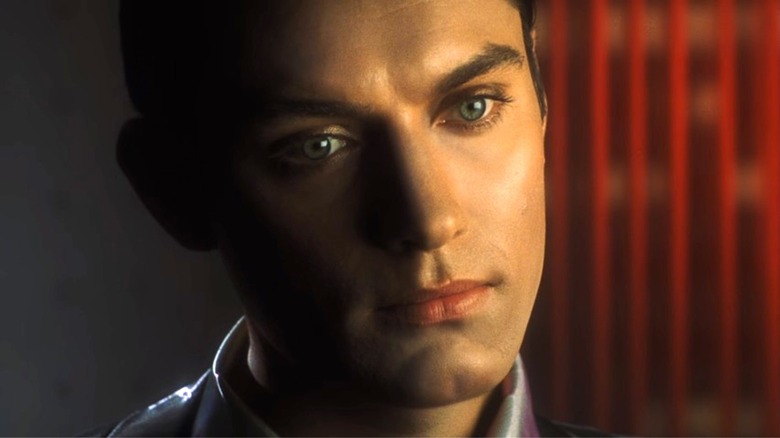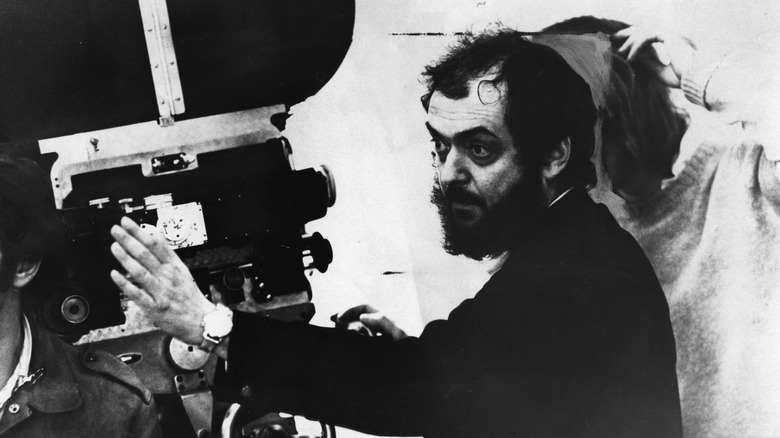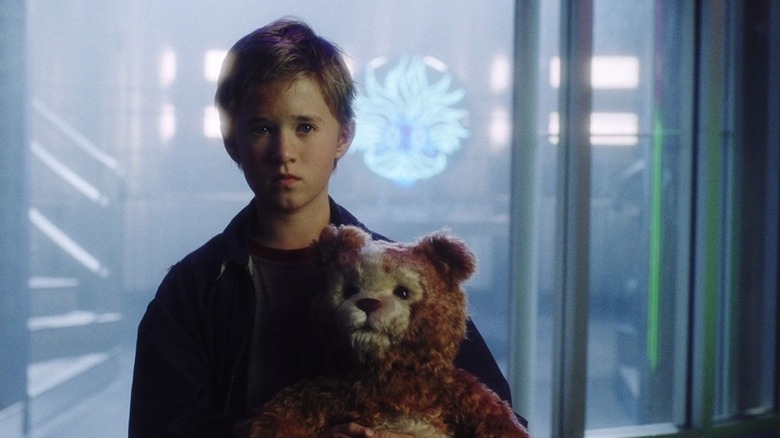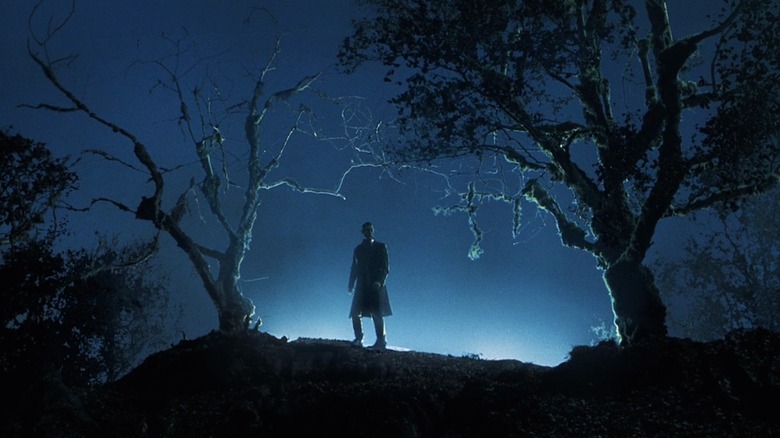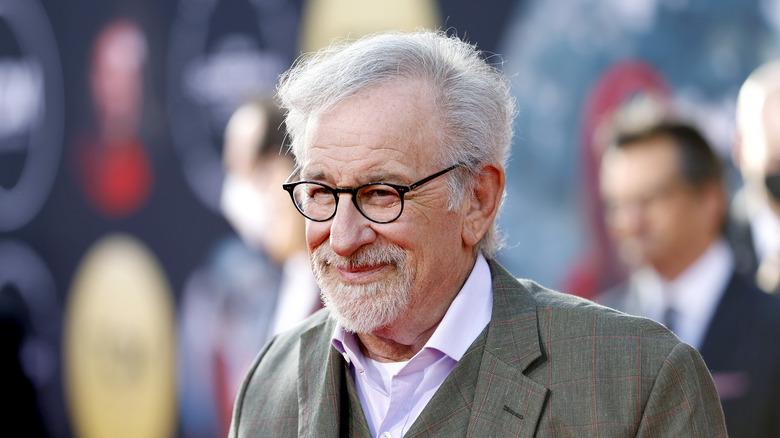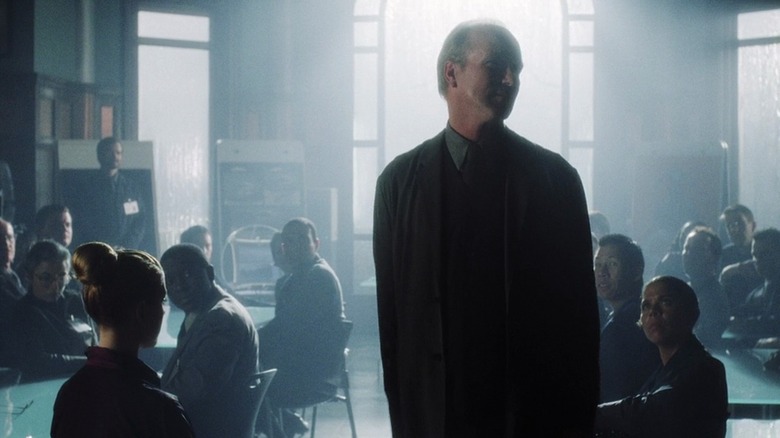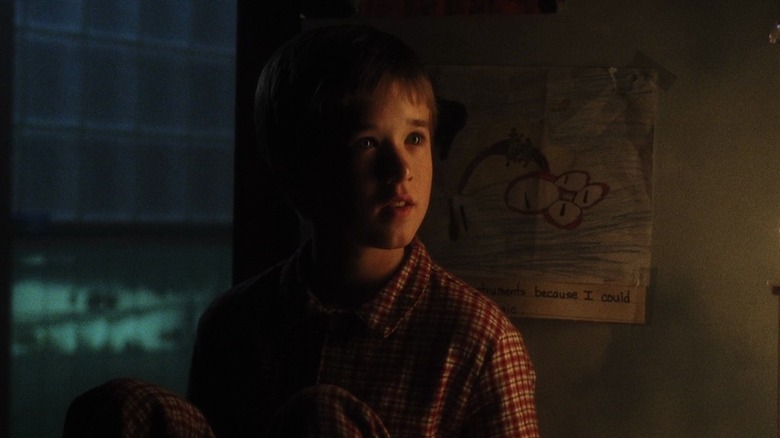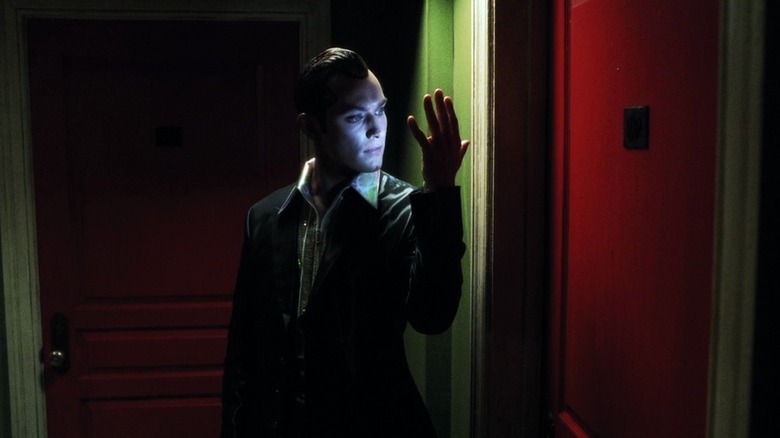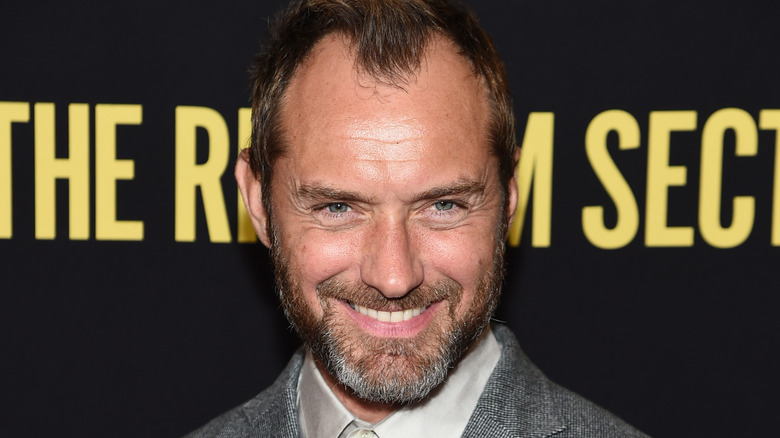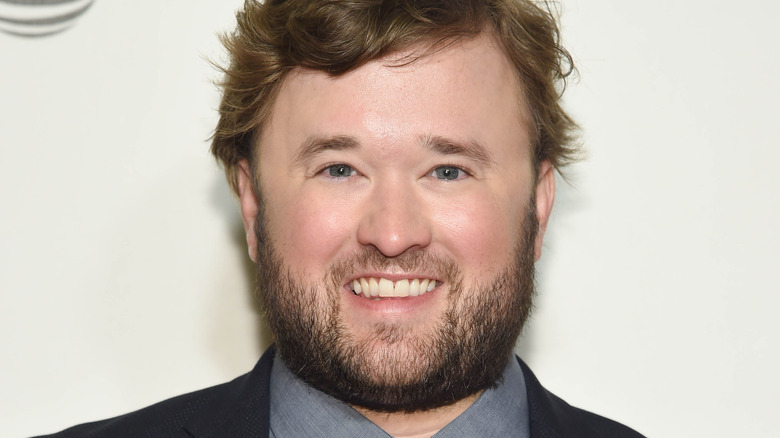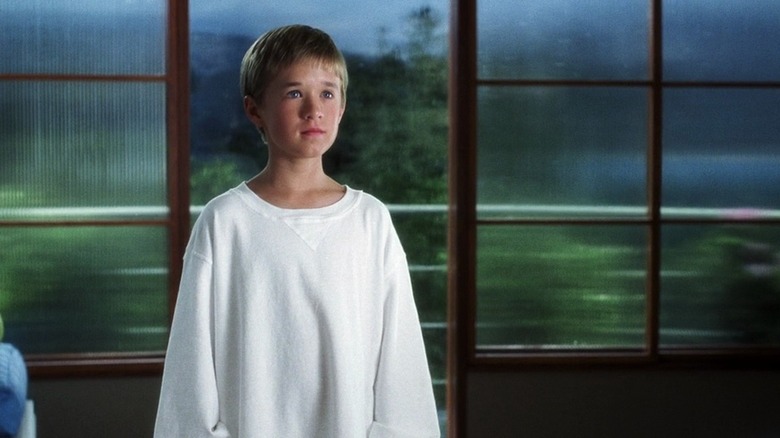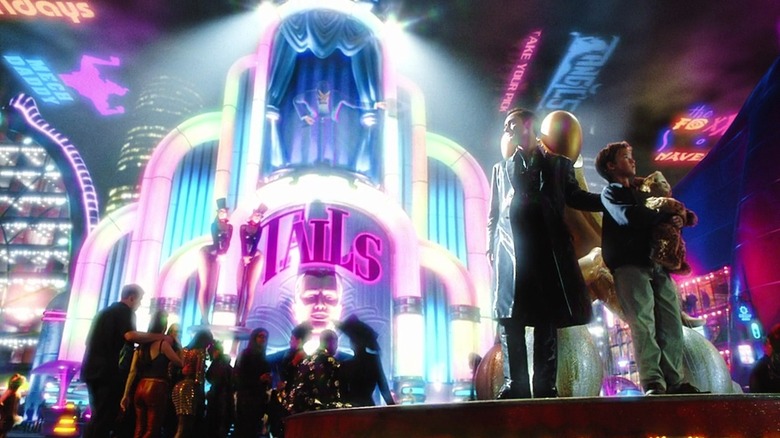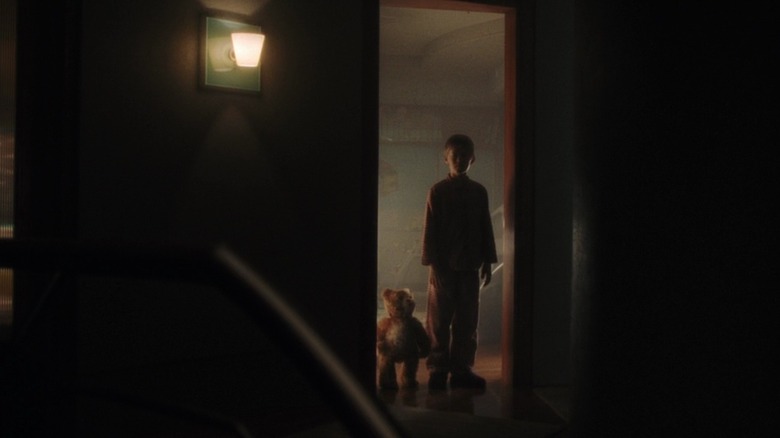The Untold Truth Of A.I. Artificial Intelligence
Steven Spielberg and Stanley Kubrick — two iconic filmmakers who share the accomplishment of forever reshaping the art of cinema. They're also two people you would never think to put together. While both are superb at crafting films with epic scopes, Spielberg's works are gifted with humanity and warmth. They can even make the biggest figures of history like Abraham Lincoln seem like tangible people. On the other hand, Stanley Kubrick was a master at cold creations that benefit from keeping viewers at arm's length. His unflinching and clinical camera was perfect for making projects like "The Shining" and "Eye Wide Shut" absolutely captivating. Both men are cinematic geniuses, but both are playing drastically different games as directors.
Yet the creative spirits of Spielberg and Kubrick melded for the 2001 movie "A.I. Artificial Intelligence," which was written and directed by Spielberg and based on a story treatment from Kubrick (which was based on the short story "Supertoys Last All Summer Long" by Brian Aldiss). This production was a massive undertaking so it's no surprise that the history of "A.I. Artificial Intelligence" is dense with details over everything from how Spielberg first heard about the movie to "A.I.'s" unique methods of viral marketing, among many other elements. It's time to delve into the untold truth of "A.I. Artificial Intelligence" and discover how the blending of such unique creative visions was handled so gracefully.
When Spielberg first heard Kubrick pitch A.I.
Steven Spielberg's attachment to "A.I. Artificial Intelligence" dates back to almost two decades before this movie would grace theaters. As recounted to the Los Angeles Times, Stanley Kubrick brought up the basic concept for "A.I." in 1985. Kubrick revealing this secret upcoming project was a breakthrough moment for the relationship between these two directors, as it signified that Kubrick had a new level of trust for the man behind "Jaws." "The story wasn't as important to me as was the fact that for the first time since we had met in 1979, he was actually telling me a story he was considering for himself as a filmmaker," Spielberg recalled.
In this initial conversation between the two men, Kubrick remarked to Spielberg that his concept for "A.I. Artificial Intelligence" made it sound a lot like the kind of motion pictures Spielberg was known for. This was a talk that lasted for well over four hours and included a moment where Kubrick became so passionate with recounting the story of "A.I. Artificial Intelligence" that the man behind "The Shining" was worried he'd begin to choke on the sandwich he was eating. At the moment, Spielberg was just grateful that Kubrick would have such an in-depth conversation with him about a prospective directorial assignment. In hindsight, this was the moment Spielberg's long journey with "A.I. Artificial Intelligence" began.
Kubrick's initial visual effects problems
While Stanley Kubrick was initially determined to make "A.I. Artificial Intelligence," he was constantly running into problems that prevented him from realizing his creative vision. Many of these issues centered on problems related to visual effects. Back in the 1980s, when Kubrick first pursued this project, the visual effects limitations of the era seemed to be strangling any possibility for compelling drama out of "Artificial Intelligence." Per a Los Angeles Times breakdown of the movie's development, this included an attempt to build an actual robotic child for the lead role, which had utterly disastrous results.
Initially, Kubrick and his creative team decided to postpone the project briefly just so that then-nascent world of computerized visual effects could grow enough to help "A.I." out. However, Kubrick kept on delaying the production, always with the belief that visual effects still weren't at the right point to realize his creative vision. The breakthrough moment for Kubrick came when he saw a movie from future "A.I." director Steven Spielberg — "Jurassic Park." Watching those CG dinosaurs move across the screen, Kubrick realized that he finally had a solution to the VFX problems that had previously kept "A.I. Artificial Intelligence" from existing.
How much of the script was done when Spielberg took over?
While Steven Spielberg was a screenwriter on "A.I. Artificial Intelligence," he wasn't working from scratch. He was building off the foundation that Stanley Kubrick had left him — and specifically for him, as Kubrick handpicked Spielberg to direct the film in 1994. Still, there was enough wiggle room in what had previously been written to afford Spielberg some creative freedom. "There was a very detailed story treatment done by Ian Watson, who worked with Stanley over a long period of time," producer Kathleen Kennedy explained to IGN. "Steven used that and a lot of Stanley's notes when he sat down and began the process of writing the screenplay."
In fleshing out the script, Spielberg remained vigilant in retaining aspects of Kubrick's vision that the filmmaker was clearly passionate about. However, he also remained aware of where the story needed extra injections of depth, such as with the character of Gigolo Joe. The fact that Kubrick had never done storyboards to accompany his story treatment also afforded Spielberg a lot of freedom when it came to plotting out the kind of visuals and shots that would be used to tell this yarn. In writing the "A.I. Artificial Intelligence" screenplay, Spielberg was entrusted with nailing a tricky balance between pleasing Kubrick's vision and his creative instincts.
The significance of Spielberg penning the screenplay
In his lengthy career as a filmmaker, Steven Spielberg has directed over 30 movies. However, his screenwriting credits are significantly smaller than that. Starting with "Close Encounters of the Third Kind" in 1977, Spielberg has only penned four screenplays to date, with all but one of those scripts being his directorial efforts ("Poltergeist" is the only exception). The minimal instances of Spielberg writing a screenplay means that anytime he takes on this job, it's a momentous occasion.
This was just as true for "A.I. Artificial Intelligence" as any other Spielberg screenplay. Variety was the first to reveal that Spielberg was writing the film's script, with this building off an original 80-page treatment penned by Stanley Kubrick. Producer Kathleen Kennedy noted that Spielberg's lengthy discussions with Kubrick about the project meant that he was in the rare position of knowing "A.I." from multiple angles beyond his own. In listening to Spielberg talk about the movie, Kennedy knew that it would've been hard to trust another writer to understand all those perspectives, making it inevitable that Spielberg would take on a rare writing credit for "A.I. Artificial Intelligence."
The looming presence of Kubrick on the set
While Steven Spielberg would be the filmmaker in charge of bringing "A.I. Artificial Intelligence" to life, the spirit of the man who was initially so gung-ho about this movie loomed large over the film's set. In a profile of "A.I. Artificial Intelligence's" production by the Los Angeles Times, cast and crew members like Jude Law would always emphasize how the feature was Spielberg's vision, but they simultaneously stressed how prominent Stanley Kubrick's presence was during the shoot.
Kubrick's presence in making "A.I. Artificial Intelligence" even extended to how closed-off this film's set was. "Stanley was fastidious about this kind of security. It's to honor his wishes that I tightened this particular production down," Spielberg explained. This director did admit that engaging in actions like these to honor the wishes of a dear filmmaking friend was a challenge but one that was necessary to make "Artificial Intelligence" as good as it could be. Plus, adhering to the desires of the recently deceased Kubrick — who passed away in 1999 — served a second purpose. As Spielberg joked in 2001, "It's my insurance policy that he doesn't haunt me afterward."
A.I. vs. Harry Potter
When you're a filmmaker of Steven Spielberg's caliber, there's never a shortage of potential directing gigs on the horizon. Rarely has this been clearer than in 1999, when Steven Spielberg was selecting what feature he would helm next. This was an important decision on several fronts, especially since this would serve as his first directorial effort after winning his second best director Oscar for "Saving Private Ryan." Additionally, this would serve as Spielberg's first movie of the 21st century. The pressure was on for the filmmaker to find the right title to live up to all this hype.
In December 1999, Variety reported that Spielberg was looking at several movies to direct next, including "A.I. Artificial Intelligence." However, there were several other major projects he was simultaneously eyeballing, including the Tom Cruise star vehicle "Minority Report" and "Harry Potter and the Sorcerer's Stone." The latter feature was one that Spielberg had talked about heavily with Warner Bros. brass, and at the time, it was unclear which of these movies would end up being Spielberg's next motion picture. In the end, Spielberg opted to pass on taking a trip to Hogwarts and pushed "Minority Report" to 2002, thus opening up a path for "A.I. Artificial Intelligence" to fit into an important slot in Spielberg's history as a director.
How Jude Law got into the role of Gigolo Joe
Jude Law's compelling on-screen performance as the mecha Gigolo Joe tips its hat to other cinematic automatons in bits of his body language and line deliveries, but for the most part, this is a very idiosyncratic vision of what a robot could behave and act like. Part of this accomplishment is due to just how much preparation and varied inspiration Law absorbed in molding his performance. Speaking to Cinema.com, Law recalled how he and choreographer Francesca Jaynes toiled away for months to get his movements of Joe just right, including how to always subtly suggest an element of seduction in his physicality, a trait emblematic of Gigolo Joe's basic programming.
To make sure that his footwork was just right for Gigolo Joe, Law studied some of the great dancers in the history of cinema. Fred Astaire was an especially notable influence on how Law approached this aspect of the character, and he also observed some of Gene Kelly's work towards the end of his training. Both because of Spielberg's insistence that Gigolo Joe's body language evoke dancing and Law's lack of experience with dancing, it took this actor a lot of time and effort to get Gigolo Joe just right. But judging by the thoroughly distinctive physical work he delivers in "A.I. Artificial Intelligence," it's clear to say he ended up delivering the goods.
Jude Law was originally going to be covered in prosthetics
Jude Law's role as Gigolo Joe in "A.I. Artificial Intelligence" was originally going to have an extra trying component. In talking to Cinema.com, Law revealed that the initial plan for making sure his character looked a bit unhuman was to cover his entire face in prosthetics. This elaborate approach was eventually discarded since the end results went too far and made Joe look exceedingly mechanical. We also imagine the idea of completely burying the face of a heartthrob like Law had to play a part in this decision.
Law then noted that the alterations to his face were limited to a prosthetic jaw while makeup was applied to his face to make it extra smooth. The latter detail was incorporated to ensure Joe looked like somebody who could inhabit the Western ideal of masculine perfection, an ideal lover who's smooth to the touch. With these flourishes, Gigolo Joe was able to look discernibly different from the human characters in "A.I. Artificial Intelligence" while also not looking so detached from humanity that audiences could no longer get emotionally invested in him.
Haley Joel Osment's reflections on A.I. Artificial Intelligence
When he was taking on the role of David in "A.I. Artificial Intelligence," Haley Joel Osment was on a hot streak as a child actor thanks to starring in M. Night Shyamalan's "The Sixth Sense." Only 13 years old when "A.I." hit theaters, this movie was another indicator of just how in-demand Osment was by some of the biggest directors on the planet. In the years since "A.I.," Osment has kept consistently busy with roles in a variety of movies, TV shows, and video games. However, even with so many different projects under his belt, Osment still considers "A.I." to be an incredibly special entry in his filmography.
Talking to Comingsoon.net in 2020, Osment noted there were lots of aspects of "A.I. Artificial Intelligence" that he was proud of, including how its approach to technology would only grow more and more relevant as the world becomes more dominated by all things computerized. "I'm really proud of the emotional implications ... of creating something and what responsibility you have to that thing that you've created, even if it's not human," Osment recalled. "That's a question we explored while making the movie and for me as an audience member now, that's something that I'm constantly thinking about." Considering his fascination with this movie's underlying themes, it's no wonder Osment considers "A.I. Artificial Intelligence" to be one of the greatest films he's appeared in.
The bizarre viral marketing for A.I.
Throughout the 21st century, viral marketing has become a more and more common tool to promote movies, and it's always evolving as our relationship with the internet ebbs and flows. Back in 2001, "A.I. Artificial Intelligence" was on the cutting edge of viral marketing in an era where it wasn't a go-to avenue for promoting movies. As noted by Den of Geek, "A.I.'s" viral marketing began with a credit for a fictitious woman named Jeanine Salla on the film's poster.
Credited as a "Sentient Machine Therapist," those who searched for Salla online would find various websites talking about this nonexistent person. All of them were part of an elaborate viral marketing ploy to help promote "A.I. Artificial Intelligence" through a string of in-universe websites that fleshed out the movie's lore — websites that would be collectively known as The Beast and that would lead viewers through a murder mystery game.
Though initially flying under the radar, people on the internet soon grew obsessed with the various hidden websites and began looking for other clues in "A.I.'s" marketing, like a phone number hidden in the feature's trailer. Folks like Jordan Weisman and Sean Stewart were the masterminds behind The Beast while the mythology of these websites was originally supposed to be further explored in a series of "A.I. Artificial Intelligence" video games. Those never came to pass, but The Beast still stands as a fascinating early instance of viral marketing.
The frustrating box office
All the pre-release hype for "A.I. Artificial Intelligence" didn't end up resulting in a massive box office run for the feature. Though by no means a dud, "Artificial Intelligence" grossed $236 million globally, including a $78.6 million domestic haul, on a $90 million budget. Exempting his 1997 feature "Amistad," "A.I." was the lowest-grossing Steven Spielberg directorial effort globally since "Always" in 1989. At the global box office in 2001, "A.I." came in at 17th place behind significantly cheaper titles like "Bridget Jones's Diary" and "American Pie 2."
Part of the problem "A.I. Artificial Intelligence" faced was how it didn't quite live up to what people expected from a summertime Spielberg movie. Rather than being thrilling and full of astounding escapism, "A.I." was a dark feature, with even its ending providing feelings of melancholy, not excitement. It didn't help that "A.I." opened just one week in North America after "The Fast and the Furious." This sleeper hit contained all the big explosions and loud noises people expect from summer blockbusters. As a result, it was the must-see movie over the lucrative 4th of July frame that year rather than "A.I. Artificial Intelligence." While it was certainly no flop in its box office run, it's understandable if financial expectations were higher for a collaboration between Kubrick and Spielberg.
How A.I. Artificial Intelligence became a cult classic
When it first came out, "A.I. Artificial Intelligence" was greeted with critical reviews that were generally mixed. There were devotees to the movie, but many were critical of the film's attempt to blend the dissonant creative vibes of Spielberg and Kubrick. In fact, there was a lot of criticism lobbed at the feature's ending, which concerned David being allowed to spend one day with his human mother thanks to the aid of advanced futuristic robots. Many perceived this conclusion to be a blast of inexplicable sentimentality that didn't fit the rest of the movie and was shoehorned in by Spielberg.
While far from a critical disaster, "Artificial Intelligence" didn't get the glowing reputation one would expect for a melding of Kubrick and Spielberg. This negative perception of "A.I." became ubiquitous enough to get referenced in an "Epic Rap Battles of History" episode that featured Kubrick insulting Spielberg by decrying "A.I." as a "waste of potential."
But then a funny thing happened. As the years went on, "A.I. Artificial Intelligence" garnered a better and better reputation. Outlets like Awards Watch and The Guardian have penned pieces not only waxing poetic on the film's virtues but also reflecting on how its initial reviews misinterpreted grim storytelling developments as surface-level schmaltz. It took a while for "A.I. Artificial Intelligence" to get its proper due, but once it did, there was an outpouring of love for this Steven Spielberg passion project.
